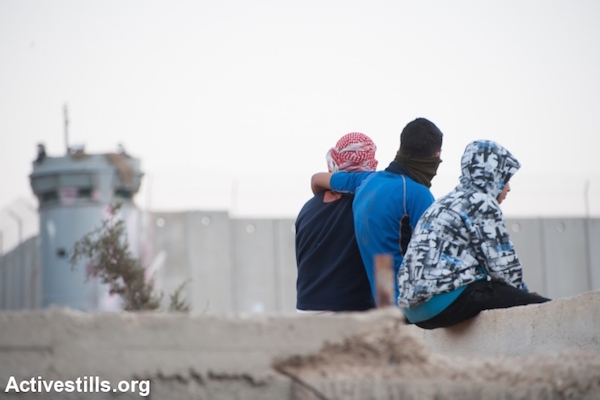The Jewish tribe has managed to stabilize its rule over the land, all while turning anyone who opposes it into a subversive or an anti-Semite. This precisely how a dictatorship functions.
By Umar al-Ghubari

Israeli Apartheid Week is upon us, and this year the government is doing everything it can to fight organizers of the Boycott, Divestment and Sanctions (BDS) movement across the world, while the Knesset is getting ready to vote on the so-called “suspension law,” which has the wholehearted support of the government itself. All this is taking place two weeks after the Knesset Ethics Committee decided to suspend three Arab members of Knesset of the Balad faction, and only months after the government decided to outlaw the Islamic Movement.
Two weeks ago, Haaret’z Zvi Barel published an article titled, “Israel Is Building a Judocracy by Silencing Arab Mourning.” The meaning of “Judocracy,” inspired by the term “ethnocracy” — coined by Professor Oren Iftachel — is as follows: under the current regime, Jews enjoy the fruits of democracy while discriminating against Palestinian citizens of Israel.
With a limited outlook at the regime and the relations between the majority and the minority inside the state (a state whose borders are unclear), the term “ethnocracy” may certainly reflect the reality in which we live. A type of democracy with preferential treatment for the ruling ethnic group. However, the relationship between Jews and Palestinians cannot be summed up with what is happening inside the country, where a Jewish majority and a Palestinian minority was created through a campaign of violence and ethnic cleansing of Palestinians on the one hand, and massive Jewish immigration on the other.
A look at the entirety of the relationship between Palestinians and Jews reveals that all Palestinians, regardless of where they live today, are under the control of the Jewish-Israel regime, and are thus influenced by its decisions. This worldview also changes the way we understand demography. The numbers teach us that there is a Jewish minority that rules over a Palestinian majority against our will. The correct definition of this situation, then, is dictatorship.

If the situation inside Israel can be defined as “ethnocracy,” then the larger picture is of an ethnic dictatorship. And instead of Judocracy, we can it a Jewish dictatorship.
The Jewish tribe has succeeded, after taking control by force, to stabilize its regime and establish a state with laws that benefit its own. It created a situation that will leave its rule unchallenged, while building foundations that prevent other groups from gaining control. The rules of the tribe forbid citizens and subjects from demanding a change in the regime or the way the state defines itself. This kind of thing is seen as illegal subversion or even anti-Semitism. This is how a dictatorship functions.
Dictatorships centralize all power, and in Israel, Jews are the ones with the ultimate power. Or more precisely: ultimate power rests in Jewish hands. The Jewish dictatorship, like all dictatorships, demands exclusive rights to the regime, leaving everyone else its subjects. The regime will be Jewish alone. God forbid we reach a situation in which we live in a Jewish-Arab state, for instance, or a state of all citizens. Even the left-wing faction of the Jewish-Zionist tribe fears equality or working with Arabs. We must separate, they say. The sons of the tribe will maintain their privileges, while all the others will need to struggle for their rights. The rulers may change, but they will always be either part of the tribe or pre-approved by it.

The Palestinians, who have been torn apart, separated, and granted different statuses by the state, are all hostages living under some form of Israeli rule. Their fate depends on the decisions of the state of the Jews. Some of them became citizens and live under oppression inside the borders of the state, others live under military rule or in one of the biggest ghettos in history, while many others live in the diaspora and are prevented from returning to their homeland, from which their parents and grandparents were expelled.
The Jews built a democracy for themselves. For Palestinians, they built a cruel and clever dictatorship. Since the beginning of the Nakba, which brought about a catastrophe for the Palestinian people, the dictatorship has not had much of a problem “democratically” voting on decisions that solidify Jewish supremacy. In a dictatorship, the glass ceiling is set by the dictator himself.
Prime Minister Benjamin Netanyahu expressed this very sentiment during a recent Knesset speech, in which he said that Arabs “deserve civil, but not national rights.” In other words, we are the masters — you are second-class citizens. Make peace with that.
Umar al Ghubari is group facilitator, a political educator, and he documents and photographs the Palestinian Nakba. This article was first published published in Hebrew on Local Call — read it here.

